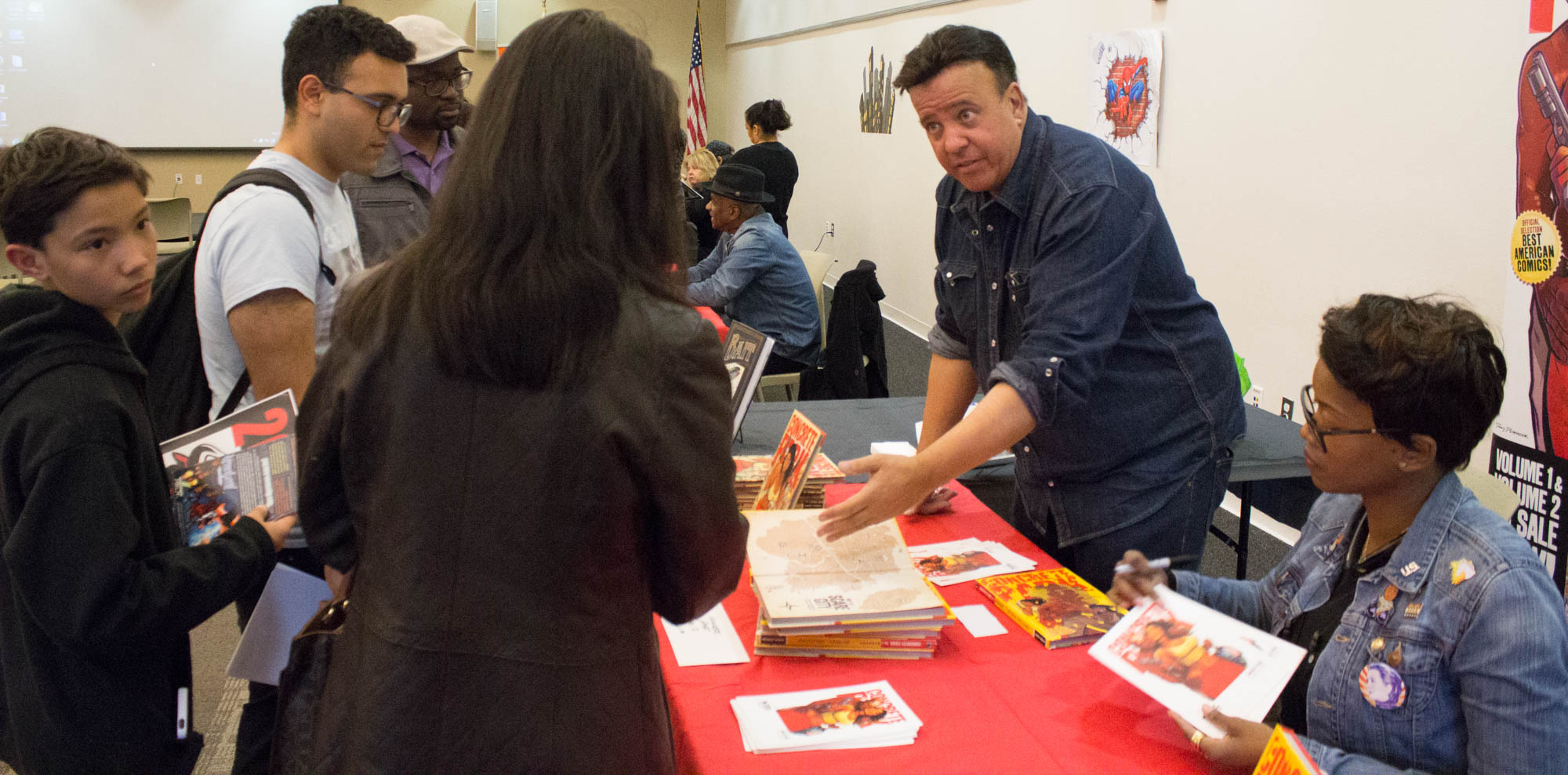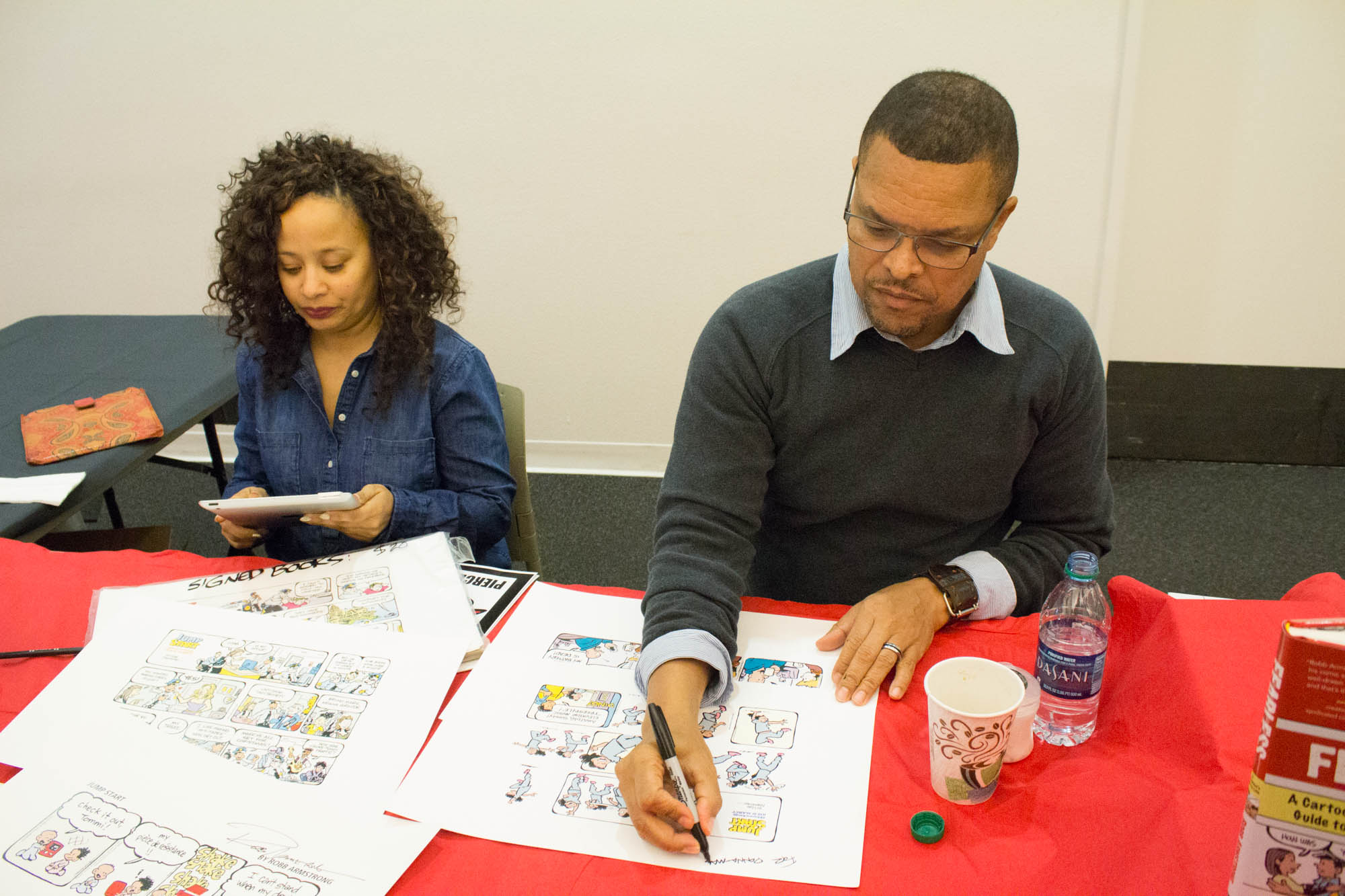Before superheroes ever have a chance to put on their capes and save the world, the artists who create them must use their markers and pencils and fight to bring these characters to life.
During the Black History Art Con on March 2, writers and illustrators of comic books shared their stories about what drew them to the pages. About 100 people attended the event in the Great Hall from 5-9 p.m.
The art con was not only to showcase the work of the comic books on display, but to learn more about the writers and artists who developed them during the discussion portion of the event.
Eric Dean Seaton is a director who has worked on television shows such as “Sonny with a Chance”, “That’s so Raven” and “Good Luck Charlie.” Seaton developed a love for comic books after reading them endlessly during trips out with his father on the weekends.
When he moved to Los Angeles, the first job Seaton had was on a show where the director was married to the president of Marvel Comics.
Seaton ran into the president multiple times until one day he was invited to the comic company’s studio to see how things worked.
“At the end of the night they asked me if I wanted to write a Spiderman chapter special,” Seaton said. “I always say it’s like you’re a basketball player and you get to play in the NBA finals for one minute. After that you’re addicted.”
“The Legend of Mantamaji” is Seaton’s comic series that was developed over the course of several years after working with Marvel.
“I’ll always be a director by trade,” Seaton said. “I would love to keep telling stories, but I’m an independent so it takes a lot more effort to get the support.”
Not everyone has had the same type of entry into the comic world. Tony Puryear, a screenplay writer, and Erika Alexander, an actress, had a rough beginning.
They tried pitching their story “Concrete Park” as a feature film to the president of a studio that saw their material, which contained black faces, and rejected their idea.
“He said, ‘Let me stop you right there. You’re wasting your time. Black people don’t like science fiction because they don’t see themselves in the future.’ And he’s sitting there telling two black creators this,” Puryear said.
Puryear said he and Alexander felt highly disrespected after that.
“Not only was it racist, it was double racist. He not was only telling us something that we knew better than, it was just horrible to jump to that conclusion,” Puryear said. “But it was also double racist because he was assuming that we only wanted to make our film for the cultural ghetto of being a little black film. Our ambitions are huge. We want everybody, like “Game of Thrones,” that’s how we see ourselves.”
More than seven years ago, Puryear and Alexander left the conference room and decided to create their story as a graphic novel because “you can really make a movie on paper.”
Alexander said they wouldn’t have been able to put their story together if not for Puryear.
“He’s being modest,” Alexander said of Puryear. “He did a few panels and sent them off to Mike Richardson accidentally, but he pushed send and Mike Richardson got back to him and he said he’d love to talk to him about it,” Alexander said. “We wouldn’t be here past him really challenging himself to do it and what came out was really gorgeous.”
Alexander and Puryear were married for 20 years before divorcing, but continued to work on many projects together including their graphic novel “Concrete Park,” which was named the best American Comic of 2013.
“Erika had never written a comic book before and I had never drawn one, but we weren’t going to let that stop us,” Puryear said.
The art con housed artists of varying talents and backgrounds. Robb Armstrong is a cartoonist and author that got his start as a teenager.
The death of his mother and the murder of his brother motivated him to not give up on his dreams because life was too short, Armstrong said.
He sold his first professional cartoon at 17 to Syracuse University.
“That was a big boost for me. It removed the kind of fear that any young person might feel trying to break into a difficult field and thinking, ‘I’m a nobody,’” Armstrong said. “I had sold something so young that I felt that I was at home in that field.”
“Star Trek: Enterprise” star Anthony Montgomery enjoys telling people a message every time he speaks with them no matter who they are.
“I might not be related to you. I might not know you at all, but I will always tell you to follow your dreams,” Montgomery said. “I didn’t have that growing up, and I would have never thought I would be where I am today. So, I want to make sure if nobody else tells you, you hear it from me.”





